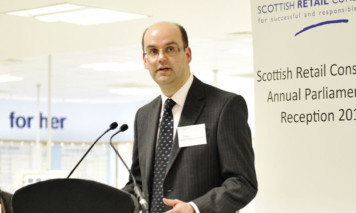The director of the Scottish Retail Consortium has urged businesses to “remain engaged” in politics as new economic powers are transferred north to Holyrood.
David Lonsdale said companies had a responsibility to ensure the new powers agreed through the Smith Commission process following September’s referendum on independence were used to make Scotland an even betetr place to do business.
“Holyrood is set for more economic responsibility, and business must remain engaged in the debate for two reasons,” Mr Lonsdale said.
“Firstly, the new devolved powers need to be implemented in a sensible and cost effective fashion.
“Secondly, the powers must be used positively to encourage private sector investment and job creation. The issue is far too important to simply leave to our politicians.
“More powers, however, shouldn’t be seen as an end in itself.
“Scotland is a good place to do business but it could be better. Our politicians will enhance our prospects further by prioritising a competitive environment for retailers to invest.”
Retail remains Scotland’s largest private sector employer and Mr Lonsdale said 2014 had proven to be a “mixed year” for the industry.
He said structural change within the sector had continued apace during the period – a total of 21% of non-food sales are now carried out online and the use of digital retail channels continues to grow – but consumers had remained cautious about their spending.
He said shop price inflation had “thankfully” been at a record low during the year due to fierce competition and low food prices had helped households with lower incomes which typically spend proportionally more of their budget on groceries.
Despite a positive bounce in high street footfall in the second half of 2014 – an uplift boosted by significant use of in-shop promotions and sales related to high profile sporting events – the SRC recorded only “tepid” actual sales growth during the year with clothing and footwear being the best performing categories.
Mr Lonsdale said shop vacancy rates had improved during the year – albeit one in every eleven shops in Scotland remains empty – but shoplifting remained a major concern for the industry with thefts up 5% during the year and the average incident costing £177.
He said shoplifting was “far from a being a victimless crime” with retailers’ ability to service their customers and improve their overall offering impaired every time stock was stolen from their shelves.
However, Mr Lonsdale was upbeat about how the 12 months ahead would pan out out.
“2015 holds out the prospect of a better year for retailers, especially with encouraging news of late on employment and with wages growth outstripping overall inflation,” he said.
“While it is ultimately up to retailers to work hard to sustain any improvement in their fortunes, government can assist by ensuring that the retail industry, Scotland’s largest private sector employer, is even better placed to be able to invest, expand and create jobs.
“In 2015’s UK General Election retailers will want to see policies from the political parties which put money into people’s pockets, keep down the cost of doing business, and facilitate retail investment and expansion.
“Continuing to reduce the deficit in the public finances will militate against the need for future tax rises that could hold back the economy. Our members also want to see greater predictability over the future direction for the national minimum wage.”
